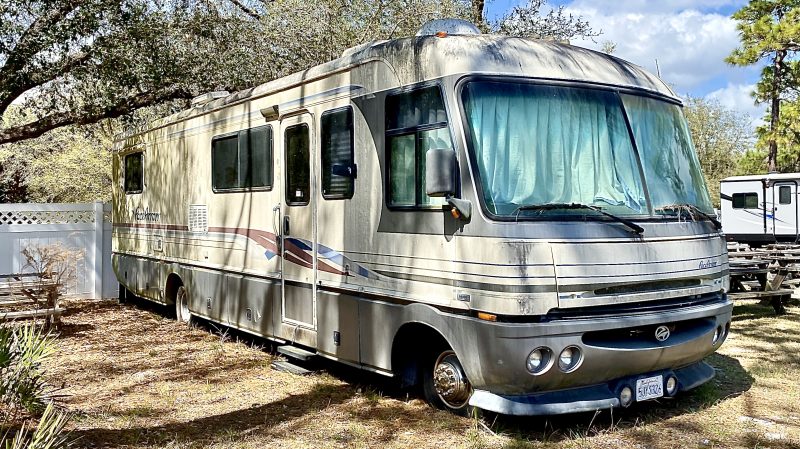So you’re considering buying a new (or used) RV – congratulations! The RV lifestyle is a fun and exciting one.
Still, it’s crucial to know that your new motorhome or trailer won’t last forever.
But how long can you expect them to last, and can you do anything to keep your precious rig around a few years longer?
Roll up your sleeves, and let’s take a look.

A Breakdown of the Lifespan of an RV
Typically, RVs will last between 10 and 30 years, with most landing close to the middle of that range. In terms of mileage, this often corresponds to 100,000-300,000 miles.
How long an RV will last on the road will depend on various factors, including the style, brand, type of usage, frequency of use, and how the owners have cared for it.
Of course, that’s a wide range, but most owners should expect their RV under average use to last at least a decade, if not significantly longer.
Things That Reduce the Life of Your RV
Like any vehicle, certain behaviors can shorten the lifespan of your RV, either marginally or in profound ways. Here are some of the most common to be aware of.
Tire Blowouts
Taking care of your tires is paramount when it comes to your RV. While it may be expensive to replace them, it’s nothing compared to the cost of potential repairs from a severe accident after a blowout.
In addition, blowouts can damage far more than just your tire or axle. They can cause issues throughout your RV’s many systems due to the violence of these events.
HOT TIP
Don’t let low-quality tires, known as “China bombs“, ruin your RV road trip 💣
Water Damage
If you’ve spent any time around used RVs, you know water damage can be one of the most severe types of damage. It’s also one of the hardest to detect and most challenging to stop and repair fully.
Cracks in the shell of your camper, leaking water lines, or other issues that let water into places it shouldn’t be can cause severe deterioration in your insulation and structure.
In some cases, it can also damage other crucial aspects of your RV, like the electrical system, causing further problems.
Roof Wear Wear
Your roof takes a beating from the sun, rain, snow, bird droppings, falling rocks, and much more. All of these elements slowly (or, in some cases, not so slowly) degrade your RV’s protective roof coating or even crack or create holes.
All of this exposes crucial wiring and other systems and allows in moisture.
If you’re not doing proper RV roof maintenance, you’re asking for trouble down the road.

Electrical Issues
Enjoying power while out camping is one of the most significant benefits of many RVs, and problems with the electrical system are surefire ways to shorten your rig’s life.
These can be related to everything from water infiltration to overloaded circuits and damaged wiring.
In any case, they can be expensive to repair and significant enough to change your RV lifestyle dramatically.
How to Extend the Life Of Your RV
RV owners shouldn’t despair! Before you weep over the inevitable demise of your beloved RV, here are some behaviors that can keep your precious rig on the road for years longer than it would be otherwise.
Check Your Roof Regularly
Like many other parts of your RV, it’s relatively difficult to notice a problem with your roof until it’s gotten severe since it’s typically out of your sightline.
However, regular inspections of your roof can do wonders to sniff out minor issues that you can fix quickly and cheaply to avoid major problems like water leaks or other structural damage.
It’s as simple as climbing up and taking a look around. If you notice any cracks, dents, or different out-of-the-ordinary situations, get it checked out ASAP.
Complete Seasonal Maintenance
Whether you’re putting your RV away for the winter or simply marking the end of a long season of camping, seasonal maintenance items are essential.
These include a deep cleaning of your tanks, as well as the interior of your rig.
In addition, check on your batteries and top them off with liquid if needed. You’ll also want to lubricate your slideouts and check on your tires as necessary.
These are just a few items of a long list of seasonal maintenance items crucial to preserving your rig’s life for the long run.
Cover Your RV in the Winter
All too many people assume that since RVs are meant for camping and the outdoors, they can take everything nature can throw at them.
This leads to people leaving their RVs outdoors, uncovered for months at a time, as winter’s cold temperatures and potential snow, sleet, or rain wreak havoc on the rig.
If your RV won’t be used for a significant period and you live in a cold-weather climate, it’s worth investing in a cover for your RV. You may also want to look into covered or indoor RV storage for extra protection.

Wash the Exterior Walls
A dirty RV might not seem like a threat to your rig’s lifespan, but it can be! Dirt, sand, grime, and other debris inevitably collect on your RV’s exterior walls as you drive and camp.
Over time, they can degrade your rig’s protective coating. This can lead to a host of other potential problems.
But the solution is as simple as regular RV washes. A simple cleaning with soap and water is all your rig needs to stay in top shape.
Change Your Oil
It might seem like a no-brainer, but oil is the lifeblood of your RV. It helps numerous critical systems and pieces of equipment to function correctly.
Dirty oil doesn’t perform and introduces contaminants into your engine that can impair its function.
Just like any other vehicle, you should schedule regular oil changes. They can also be an excellent opportunity to take care of other minor maintenance issues as well.
Go Camping!
It might seem counterintuitive, but using your RV is one of the best ways to ensure it stays around. Unused RVs can face issues from dead batteries to moisture damage and musty odors from stale air inside.
Regular use will keep your systems functioning normally and ensure you notice any minor problems before they have weeks or months to get worse.
What Kind Of RV Lasts the Longest?
There’s no hard and fast rule about which RVs will last for the most amount of time on the road. As we mentioned, certain behaviors or situations can dramatically extend or shorten the lifespan of your rig.
However, travel trailers or fifth wheels tend to last longer than motorhomes. This is because there’s no need to maintain an engine.

Motorhome engine maintenance can often be the most complicated and costly repair in the RV world. A too-costly repair could force you to say goodbye to your RV earlier than expected.
Among travel trailers, Airstreams are often among the longest-lasting, thanks to their iconic aluminum shell exterior that can prevent many of the most common issues.
Take Care Of Your RV
While your beloved RV won’t last forever, there’s no reason it can’t carry you for decades to come. Most good-quality RVs will last at least a decade under everyday use.
But by avoiding problematic situations and engaging in behavior to extend your RV’s life, you can ensure 15-20 years or more of enjoyment from your rig.
How often do you intend to use your new RV?
If You Want the Latest Travel News, Join Our Mailing List
Don’t rely on biased RV industry news sources to keep you informed. Stick with Nomadic News. We publish articles and breaking stories that matter to you every weekday.









